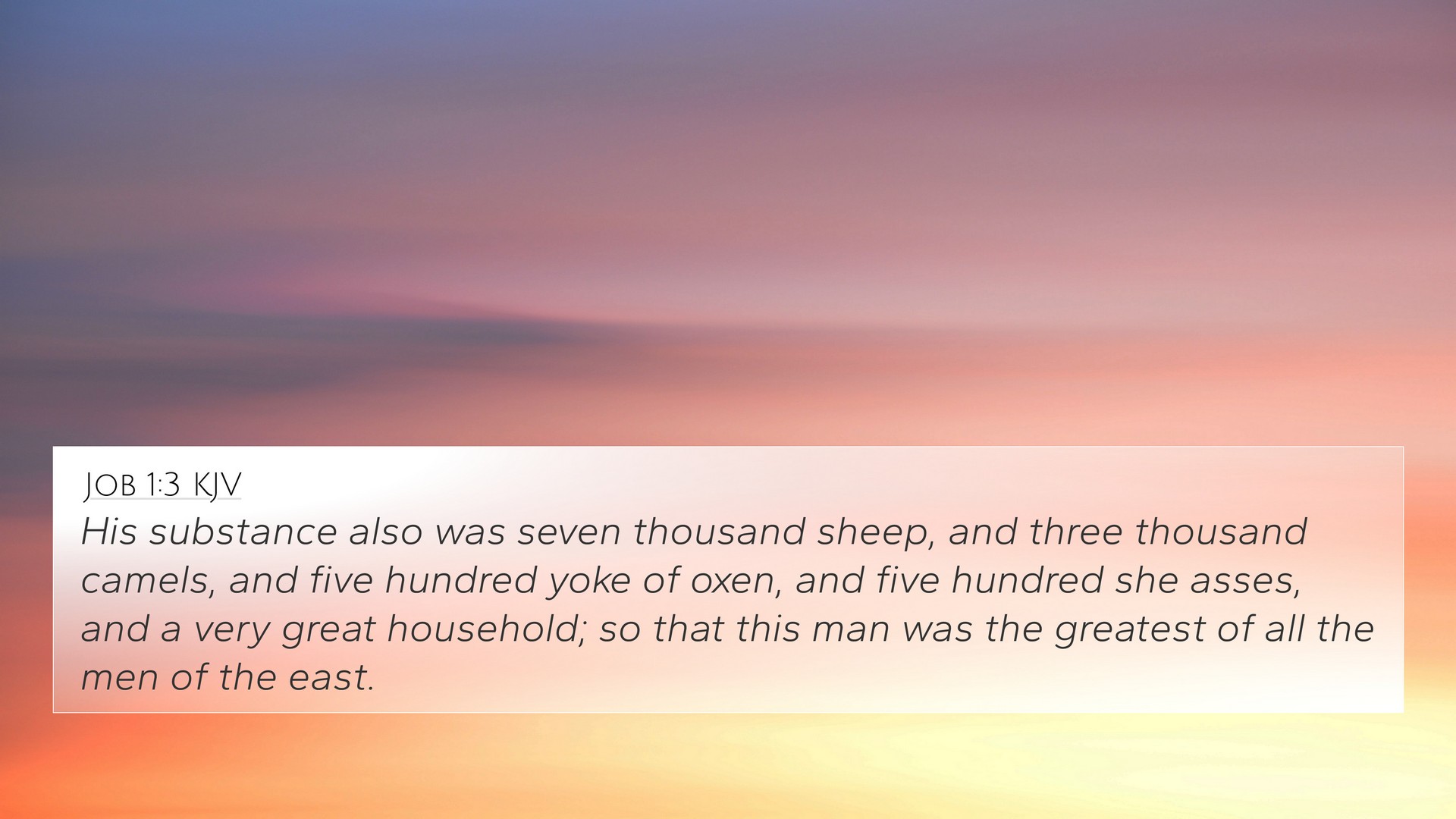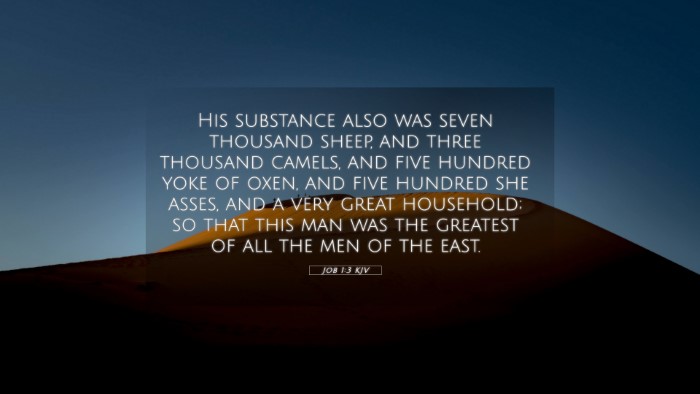Old Testament
Genesis Exodus Leviticus Numbers Deuteronomy Joshua Judges Ruth 1 Samuel 2 Samuel 1 Kings 2 Kings 1 Chronicles 2 Chronicles Ezra Nehemiah Esther Job Psalms Proverbs Ecclesiastes Song of Solomon Isaiah Jeremiah Lamentations Ezekiel Daniel Hosea Joel Amos Obadiah Jonah Micah Nahum Habakkuk Zephaniah Haggai Zechariah MalachiJob 1:3 Similar Verses
Job 1:3 Cross References
His substance also was seven thousand sheep, and three thousand camels, and five hundred yoke of oxen, and five hundred she asses, and a very great household; so that this man was the greatest of all the men of the east.
Uncover the Rich Themes and Topics of This Bible Verse
Listed below are the Bible themes associated with Job 1:3. We invite you to explore each theme to gain deeper insights into the Scriptures.
Job 1:3 Cross Reference Verses
This section features a detailed cross-reference designed to enrich your understanding of the Scriptures. Below, you will find carefully selected verses that echo the themes and teachings related to Job 1:3 KJV. Click on any image to explore detailed analyses of related Bible verses and uncover deeper theological insights.
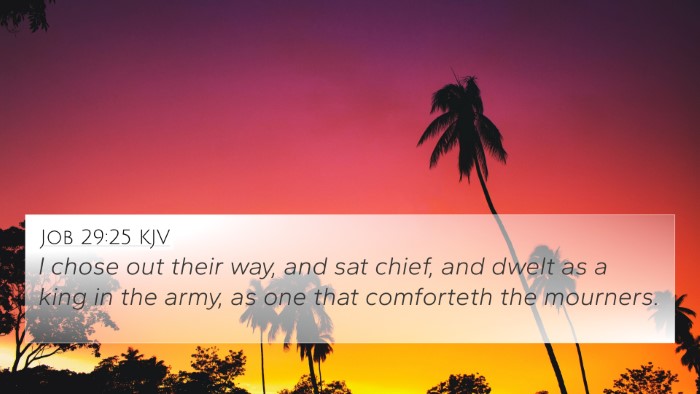
Job 29:25 (KJV) »
I chose out their way, and sat chief, and dwelt as a king in the army, as one that comforteth the mourners.
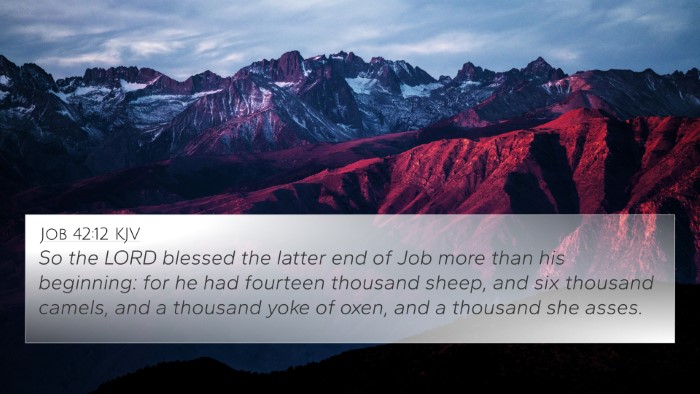
Job 42:12 (KJV) »
So the LORD blessed the latter end of Job more than his beginning: for he had fourteen thousand sheep, and six thousand camels, and a thousand yoke of oxen, and a thousand she asses.
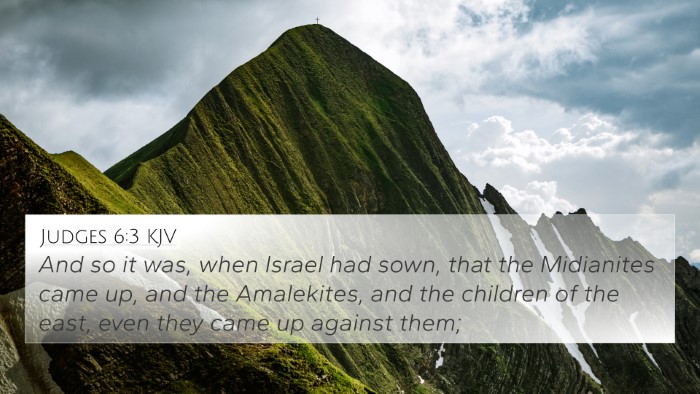
Judges 6:3 (KJV) »
And so it was, when Israel had sown, that the Midianites came up, and the Amalekites, and the children of the east, even they came up against them;
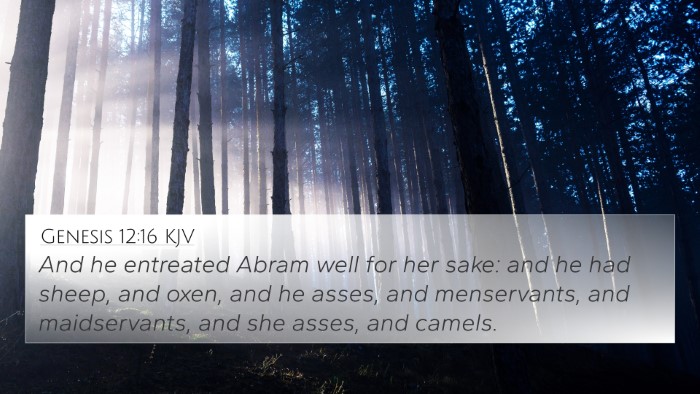
Genesis 12:16 (KJV) »
And he entreated Abram well for her sake: and he had sheep, and oxen, and he asses, and menservants, and maidservants, and she asses, and camels.
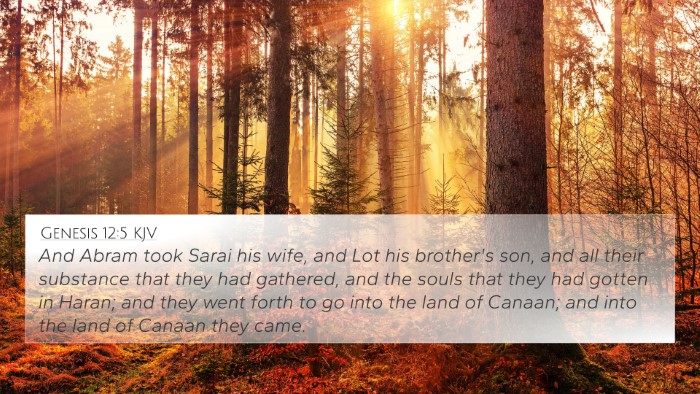
Genesis 12:5 (KJV) »
And Abram took Sarai his wife, and Lot his brother's son, and all their substance that they had gathered, and the souls that they had gotten in Haran; and they went forth to go into the land of Canaan; and into the land of Canaan they came.
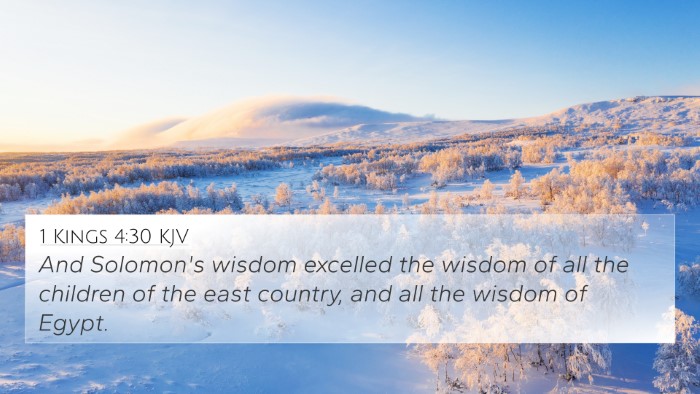
1 Kings 4:30 (KJV) »
And Solomon's wisdom excelled the wisdom of all the children of the east country, and all the wisdom of Egypt.

2 Kings 3:4 (KJV) »
And Mesha king of Moab was a sheepmaster, and rendered unto the king of Israel an hundred thousand lambs, and an hundred thousand rams, with the wool.

2 Chronicles 32:29 (KJV) »
Moreover he provided him cities, and possessions of flocks and herds in abundance: for God had given him substance very much.
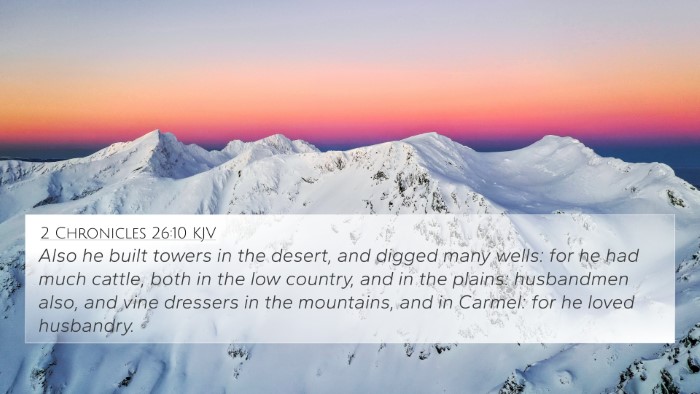
2 Chronicles 26:10 (KJV) »
Also he built towers in the desert, and digged many wells: for he had much cattle, both in the low country, and in the plains: husbandmen also, and vine dressers in the mountains, and in Carmel: for he loved husbandry.
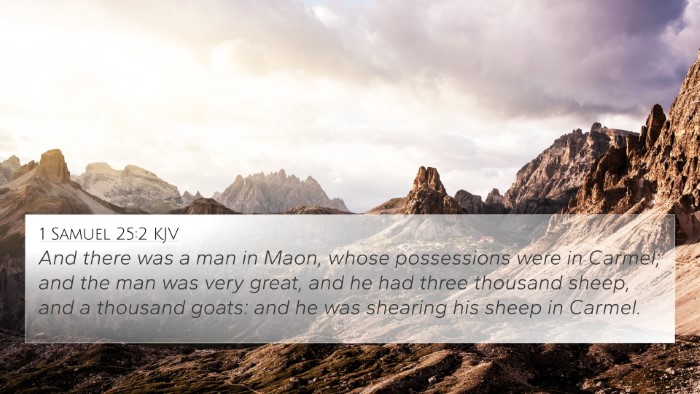
1 Samuel 25:2 (KJV) »
And there was a man in Maon, whose possessions were in Carmel; and the man was very great, and he had three thousand sheep, and a thousand goats: and he was shearing his sheep in Carmel.
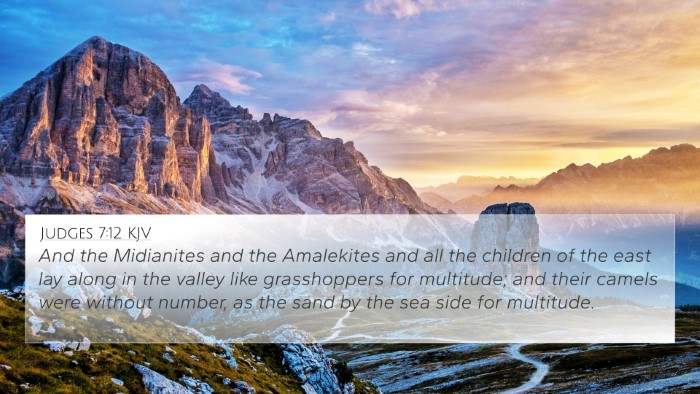
Judges 7:12 (KJV) »
And the Midianites and the Amalekites and all the children of the east lay along in the valley like grasshoppers for multitude; and their camels were without number, as the sand by the sea side for multitude.
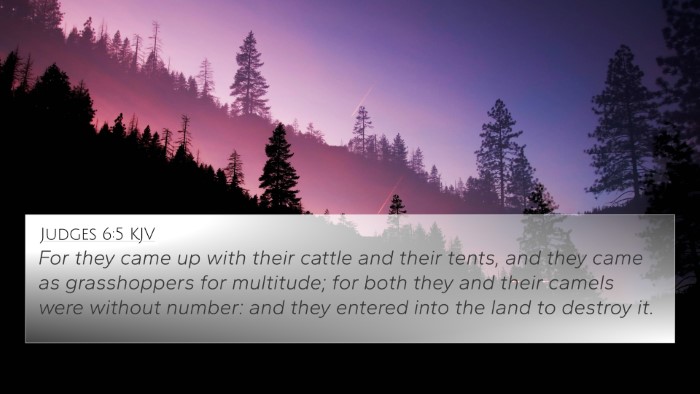
Judges 6:5 (KJV) »
For they came up with their cattle and their tents, and they came as grasshoppers for multitude; for both they and their camels were without number: and they entered into the land to destroy it.

Numbers 23:7 (KJV) »
And he took up his parable, and said, Balak the king of Moab hath brought me from Aram, out of the mountains of the east, saying, Come, curse me Jacob, and come, defy Israel.

Numbers 31:32 (KJV) »
And the booty, being the rest of the prey which the men of war had caught, was six hundred thousand and seventy thousand and five thousand sheep,
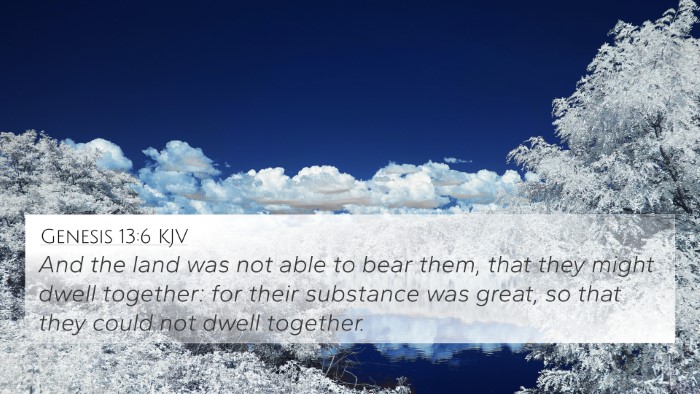
Genesis 13:6 (KJV) »
And the land was not able to bear them, that they might dwell together: for their substance was great, so that they could not dwell together.
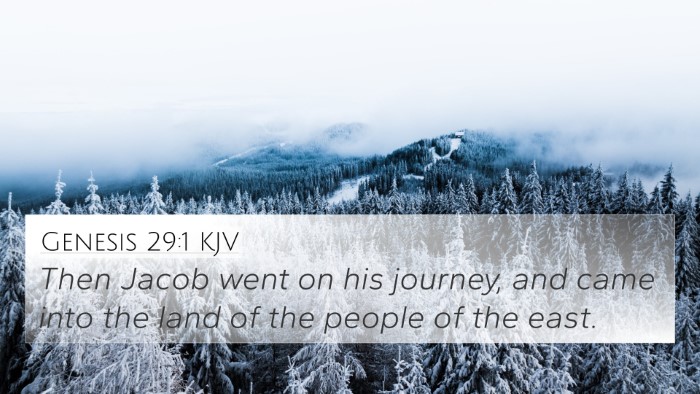
Genesis 29:1 (KJV) »
Then Jacob went on his journey, and came into the land of the people of the east.
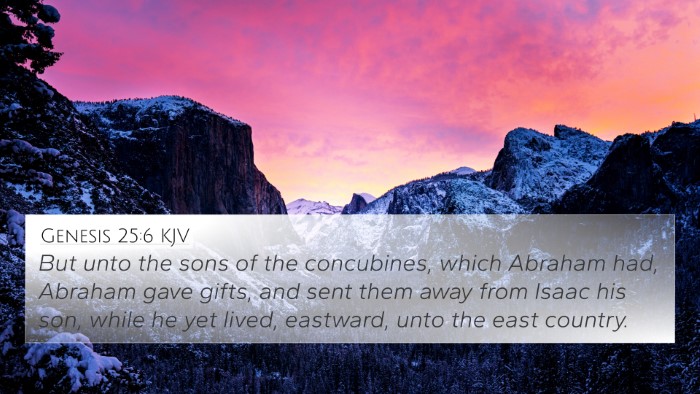
Genesis 25:6 (KJV) »
But unto the sons of the concubines, which Abraham had, Abraham gave gifts, and sent them away from Isaac his son, while he yet lived, eastward, unto the east country.
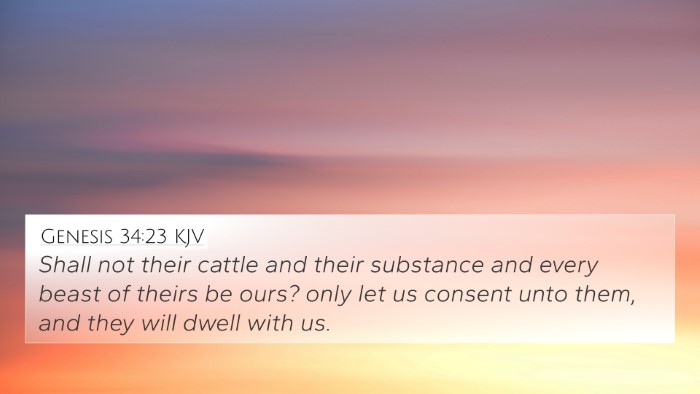
Genesis 34:23 (KJV) »
Shall not their cattle and their substance and every beast of theirs be ours? only let us consent unto them, and they will dwell with us.
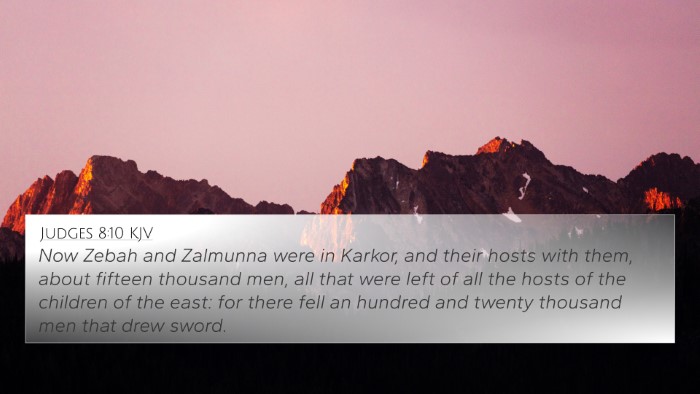
Judges 8:10 (KJV) »
Now Zebah and Zalmunna were in Karkor, and their hosts with them, about fifteen thousand men, all that were left of all the hosts of the children of the east: for there fell an hundred and twenty thousand men that drew sword.
Job 1:3 Verse Analysis and Similar Verses
Understanding Job 1:3
Job 1:3 reads: "His wealth also was seven thousand sheep, three thousand camels, five hundred yoke of oxen, and five hundred she asses: and a very great household; so that this man was the greatest of all the men of the east." This verse provides a vivid description of Job's immense wealth and status in the ancient world, serving as a backdrop for the unfolding narrative regarding his righteousness and the subsequent trials he faces.
Contextual Meaning
This verse occurs at the beginning of the Book of Job, which centers around the themes of suffering, faith, and divine justice. Job is introduced as a man of great wealth, indicating his success and favor in society. The detailed account of his possessions not only highlights his worldly status but sets the stage for the themes of loss and restoration.
Commentary Insights
According to Matthew Henry, this verse emphasizes Job's character and the blessings bestowed upon him by God. Henry notes that Job's possessions reveal his industrious nature and God’s grace in his life. Furthermore, the mention of various livestock signifies Job's prosperity and the agrarian wealth typical of his time.
Albert Barnes points out that the listing of Job's livestock conveys the idea of completeness and abundance. The figures provided are not just for illustrative purposes but serve to establish Job as a significant figure in the theological landscape of the narrative. Barnes suggests that this demonstrates the stark contrast between Job’s initial state of wealth and his later downfall.
Adam Clarke elaborates on the social implications of Job's wealth, suggesting that the large household implies not only material wealth but also influence and power in the community. Clarke indicates that Job's status as the greatest man in the East serves to magnify the tragedy of his losses and the depth of his faith when faced with suffering.
Thematic Connections and Cross-References
Job 1:3 connects with various themes and other scriptures, enriching our understanding of prosperity, suffering, and divine testing. Here are vital cross-references that illustrate these connections:
- Proverbs 10:22: "The blessing of the Lord, it maketh rich, and he addeth no sorrow with it." – This verse reflects the concept of divine blessings leading to true prosperity.
- James 5:11: "Behold, we count them happy which endure. Ye have heard of the patience of Job." – This directly links to Job’s endurance through his trials.
- Psalms 1:3: "And he shall be like a tree planted by the rivers of water, that bringeth forth his fruit in his season." – A metaphor emphasizing the blessings of the righteous, comparable to Job’s initial state.
- Matthew 5:45: "For he maketh his sun to rise on the evil and on the good…" – Illustrating God’s impartiality in blessing both the righteous and the wicked.
- Ecclesiastes 5:10: "He that loveth silver shall not be satisfied with silver…" – A reflection on wealth, which is pertinent to Job’s story.
- 1 Timothy 6:10: "For the love of money is the root of all evil…" – Ties in with the moral implications of wealth as exemplified by Job.
- Proverbs 3:9-10: "Honour the Lord with thy substance, and with the firstfruits of all thine increase." – This speaks to the responsibilities that come with wealth.
Exploring Connections Between Bible Verses
The connections between Bible verses such as Job 1:3 and those listed above offer profound insights into the nature of wealth, righteousness, and suffering in the Biblical narrative. This thematic analysis provides deeper understanding through the following:
- Comparative Bible Verse Analysis: Examining contrasts between Job's initial prosperity and the eventual challenges he faces brings clarity to the role of faith in adversity.
- Bible Concordance: Utilizing resources like a Bible concordance allows readers to explore further the geographical and social contexts surrounding Job’s life.
- Inter-Biblical Dialogue: The discussions that arise from cross-referencing Job with other texts like Proverbs and James allow for an enriched understanding of biblical themes related to wealth and trials.
- How to Use Bible Cross-References: Engaging with cross-references is vital for a comprehensive bible study, as they reveal thematic overlaps and doctrinal teachings.
- Bible Chain References: Linking texts through a chain reference method aids in understanding the overarching biblical narrative regarding God's treatment of the righteous and the wicked.
Conclusion
Job 1:3 is a crucial verse for understanding the thematic fabric of the Book of Job. Not only does it establish Job's character and the extent of his suffering, but it also sets a foundation for theological exploration into the nature of divine justice, prosperity, and faith. Readers are encouraged to delve deeper into cross-referencing biblical texts to gain comprehensive insights and interpretations.
Further Study Recommendations
For those interested in delving deeper into the understanding of Job 1:3, consider utilizing:
- Tools for Bible Cross-Referencing
- Bible Cross-Reference Guide
- Comprehensive Bible Cross-Reference Materials
- Cross-Referencing Bible Study Methods
